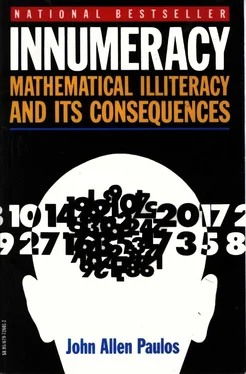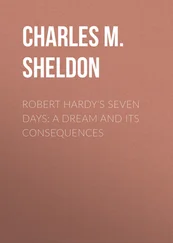Let's examine a preliminary and relevant probability oddity, whose discovery is due to statistician Bradley Efron. Imagine four dice, A, B, C, and D, strangely numbered as follows: A has 4 on four faces and 0 on two faces; B has 3s on all six faces; C has four faces with 2 and two faces with 6; and D has 5 on three faces and 1 on three faces.
If die A is rolled against die B, die A will win- by showing a higher number-two-thirds of the time; similarly, if die B is rolled against die C, B will win two-thirds of the time; if die C is rolled against die D, it will win two-thirds of the time; nevertheless, and here's the punch line, if die D is rolled against die A, it will win two-thirds of the time. A beats B beats C beats D beats A, all two-thirds of the time. You might even profit from this by challenging someone to choose whatever die he or she wanted, and you could then choose a die which would beat it two-thirds of the time. If they choose die B, you choose A; if they choose A, you choose D; and so on.
That die C beats die D may require some explanation. Half of the time, a 1 will turn up on die D, in which case die C will certainly win. The other half of the time, a 5 will turn up on die D, in which case die C will win one-third of the time. Thus, since C can win in these two different ways, it beats D exactly 1/ 2 + ( 1/ 2x 1/ 3) = 2/ 3of the time. A similar argument can be used to show that die D beats die A two-thirds of the time. This kind of nontransitivity (where X beats Y and Y beats Z and Z beats W, but W nevertheless beats X) is at the base of most voting paradoxes, from the Marquis de Condorcet in the eighteenth century to Kenneth Arrow in the twentieth.
The possibility of social irrationality resting on a base of individual rationality is suggested by a slight variant of Condorcet's original example. In it there are three candidates for public office, whom I'll call Dukakis, Gore, and Jackson, to commemorate the 1988 Democratic primary battles. Assume that one-third of the electorate prefers Dukakis to Gore to Jackson, that another one-third prefers Gore to Jackson to Dukakis, and that the last one-third prefers Jackson to Dukakis to Gore. So far, so good.
But if we examine the possible two-man races, a paradox appears. Dukakis will boast that two-thirds of the electorate prefer him to Gore, whereupon Jackson will respond that two-thirds of the electorate prefer him to Dukakis. Finally, Gore will counter by noting that two-thirds of the electorate prefer him to Jackson. If societal preferences are determined by majority vote, "society" prefers Dukakis over Gore, Gore over Jackson, and Jackson over Dukakis. Thus, even if the preferences of all the individual voters are rational (i.e., transitive- whenever a voter prefers X to Y and Y to Z, then that voter prefers X to Z), it doesn't necessarily follow that the societal preferences determined by majority rule are transitive, too.
Of course, in real life, things can get considerably more complex. Mort Sahl remarked about the 1980 election, for example, that people weren't so much voting for Reagan as they were voting against Carter, and that if Reagan had run unopposed he would have lost. (I don't know how to model that situation.)
One should not get the mistaken impression that Condorcet's paradox and Sahl's joke are equally unrealistic. The economist Kenneth Arrow has proved a very powerful generalization which shows that something like the above situation characterizes every voting system. Specifically, he demonstrated that there is never a way to derive societal preferences from individual preferences that can be absolutely guaranteed to satisfy these four minimal conditions: the societal preferences must be transitive; the preferences (individual and societal) must be restricted to available alternatives; if every individual prefers X to Y, then the societal preference must be for X over Y; and no individual's preferences automatically determine the societal preferences.
LAISSEZ-FAIRE: ADAM SMITH OR THOMAS HOBBES
A different sort of conflict between the individual and society is revealed in a dilemma devised by the logician Robert Wolf that is related to the more famous prisoner's dilemma, to which we'll return shortly. Both demonstrate that acting in one's self-interest does not always best serve one's self-interest.
Imagine that you and twenty casual acquaintances are in a room together, having been brought there by an eccentric philanthropist. None of you can communicate in any way with one another, and you're each given the choice of either pressing a small button in front of you or not.
If all of you refrain from pressing the button, you'll each receive $10,000 from the philanthropist. But if at least one of you presses the button, those of the group who press the button will receive $3,000 and those who refrain from pressing the button will receive nothing. The question is, do you press the button for a sure $3,000, or refrain and hope that everybody else in the group does the same, so that you each get $10,000.
Whatever your decision, one can vary the stakes or the number of people involved so as to induce you to reverse your decision. If you decided to press the button, you probably would have reversed your decision if the stakes had been $100,000 vs. $3,000. If you refrained from pressing, you would probably have reversed that decision if the stakes had been $10,000 vs. $9,500.
There are other ways of raising the stakes. Replace the eccentric philanthropist with a powerful sadist. If no member of the group presses the button, he'll allow each of you to leave safely. However, if some of you do press the button, the ones who do will be forced by the sadist to play Russian roulette, with a 95 percent chance of survival, while the ones who don't will be killed outright. Do you press the button and take the 95 percent chance of survival, and assume the cost of indirectly leading to the deaths of others, or do you resist your fear and not press the button and hope that no one else's fear gets the better of him?
Wolf's dilemma often arises in situations where we fear we're going to be left behind if we don't watch out for ourselves.
Now consider the case of two women who must make a brief, hurried transaction (let's suppose they're drug traffickers). The women exchange filled brown-paper bags on a street corner and depart quickly before checking the contents of the bag each has received. Before the meeting, each has the same option: to put in her bag the item of worth which the other wants (the cooperative option) or to fill it with shredded newspaper (the individualist option). If they cooperate with each other, each will receive what she wants, but at a fair cost. If A fills her bag with shredded newspaper and B doesn't, A will get what she wants at no cost and B will be duped. If they both fill their bags with shredded newspaper, neither will get what she wants, but neither will be duped.
The best outcome for the women as a pair is for them to cooperate with each other. A, however, can reason as follows: If B takes the cooperative option, I can get what I want at no cost to me by taking the individualist option. On the other hand, if B takes the individualist option, at least I won't be duped if I do, too. Thus, regardless of what B does, I'm better off if I take the individualist alternative and give her a bag full of newspaper. B can, of course, reason in the same way, and they're both likely to end up exchanging worthless bags of shredded newspaper.
A similar situation can arise in legitimate business transactions or, indeed, in almost any sort of exchange.
The prisoner's dilemma owes its name to a scenario, formally identical to the one above, wherein two men suspected of a major crime are apprehended in the course of committing some minor offense. They're separated and interrogated, and each is given the choice of confessing to the major crime and implicating his partner or remaining silent. If they both remain silent, they'll each get only one year in prison. If one confesses and the other doesn't, the one who confesses will be rewarded by being let go, while the other one will get a five-year term. If they both confess, they can both expect to spend three years in prison. The cooperative option is to remain silent, while the individualist option is to confess.
Читать дальше












